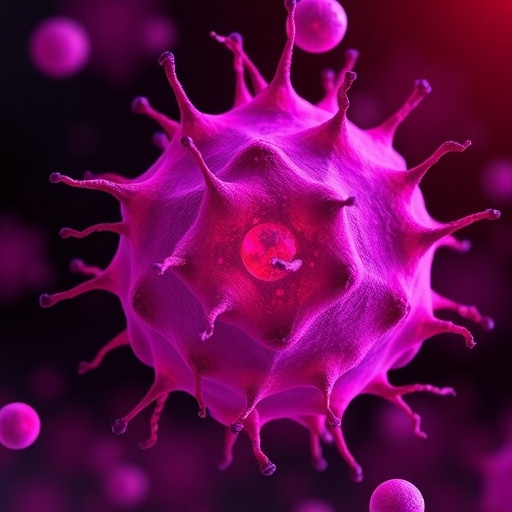In a groundbreaking study that challenges long-held assumptions in oncology, researchers at the Korea Advanced Institute of Science and Technology (KAIST) have unveiled new insights into the phenomenon of nuclear hypertrophy in cancer cells. Traditionally regarded as a hallmark of tumor progression and malignancy, the enlargement of cancer cell nuclei has now been identified as a complex, adaptive response to replication stress rather than a direct driver of cancer aggressiveness. This paradigm-shifting discovery not only redefines how nuclear morphology is understood in the context of cancer biology but also unveils promising avenues for novel diagnostic and therapeutic strategies aimed at curbing metastasis.
Cancer cells, as frequently observed in pathological examinations, tend to showcase nuclei that are disproportionally larger than those of normal cells. For decades, this nuclear enlargement has been associated with poor prognosis and advanced cancer stages. Despite its prevalence in clinical biopsy imaging, the molecular and mechanistic underpinnings of nuclear hypertrophy remained ambiguous, obscuring potential clinical implications. The KAIST team, spearheaded by Professor Joon Kim from the Graduate School of Medical Science and Engineering, in collaboration with Professors Ji Hun Kim and You-Me Kim, embarked on an ambitious research endeavor to unravel the causal factors and consequences of nuclear hypertrophy in cancer cells.
Central to their findings is the identification of DNA replication stress as the primary catalyst for nuclear enlargement. Replication stress, a condition characterized by the disruption of the cell’s DNA duplication process, induces significant cellular strain and genomic instability. It has long been recognized as a pervasive feature in cancer cells, contributing to mutagenesis and tumor heterogeneity. The KAIST researchers demonstrated that this stress triggers the polymerization and aggregation of actin proteins within the nucleus, a phenomenon fundamentally altering nuclear architecture and size.
This novel insight overturns the simplistic narrative that nuclear hypertrophy is an advantageous trait evolved by malignant cells to promote tumor fitness. Instead, the enlargement is revealed as a transitory, compensatory mechanism—a cellular response aimed at mitigating the detrimental effects of replication stress. Remarkably, this hypertrophic state appears to impose constraints on the metastatic potential of cancer cells, contradicting the entrenched belief that larger nuclei signify increased malignancy and invasiveness.
The research methodologies employed by the team exemplify a robust and multidisciplinary approach. Through comprehensive gene function screening involving systematic inhibition of thousands of genes, they pinpointed critical regulators orchestrating nuclear size modulation. Subsequently, transcriptome analyses provided a global view of gene expression changes concomitant with nuclear enlargement, identifying specific genetic programs activated in response to replication stress. High-resolution three-dimensional genome (Hi-C) structural analyses revealed that nuclear hypertrophy is not merely a volumetric anomaly but is intricately linked to reconfigured chromatin topology and spatial genome organization. This chromatin remodeling potentially influences gene regulatory networks and cellular phenotypes.
Further consolidating these molecular findings, in vivo studies utilizing mouse xenograft models evidenced that cancer cells exhibiting nuclear hypertrophy demonstrated diminished motility and metastatic capabilities. This functional impairment aligns with the concept that nuclear enlargement serves a protective role, restricting the dissemination of cancer cells and thereby curbing metastasis. Such a discovery prompts a reevaluation of nuclear size as a clinical marker, suggesting its potential utility not as an indicator of aggressive tumor behavior but as a prognostic marker for suppressed metastasis.
Professor Joon Kim emphasized the clinical relevance of these findings, stating that the elucidation of DNA replication stress as a determinant of nuclear size imbalance sheds light on a vexing pathological question. The prospect of harnessing nuclear structural changes as biomarkers for cancer diagnosis and metastasis prediction represents a transformative step forward, potentially refining patient stratification and therapeutic decision-making.
This study also underscores the pivotal contributions of early-career researchers, with Dr. Changgon Kim, now a Hematology and Oncology specialist at Korea University Anam Hospital, and PhD candidate Saemyeong Hong playing co-lead roles. Their collaborative efforts across molecular, structural, and in vivo experimental domains culminated in this impactful publication, which appeared in the prestigious journal Proceedings of the National Academy of Sciences (PNAS) on September 9th.
Intriguingly, the research outcomes invite a broader contemplation of how cancer cells negotiate internal stresses and how these accommodations influence tumor evolution. The modulation of nuclear dimensions via actin polymerization in response to replication perturbations represents a sophisticated cellular balancing act, reflective of the inherent plasticity and complexity of cancer pathophysiology.
Looking ahead, this research paves the way for exploring nuclear hypertrophy not just as a diagnostic curiosity but as a potential therapeutic target. If nuclear size alterations serve to restrict metastatic dissemination, then interventions designed to modulate replication stress responses or nuclear architecture could enhance cancer containment and improve clinical outcomes. The interplay between chromatin structure, gene regulation, and cellular biomechanics portrayed in this study enriches our understanding of tumor biology and offers fertile ground for innovation.
Supported by the Mid-career Researcher Program and the Engineering Research Center (ERC) program under the National Research Foundation of Korea, this research exemplifies the power of integrative biomedical science in challenging dogma and uncovering hidden dimensions of disease biology. As the oncology community absorbs these findings, the reappraisal of nuclear hypertrophy may recalibrate diagnostic criteria and inspire new therapeutic horizons, heralding a future in which the nuclear landscape is harnessed to combat cancer more effectively.
Subject of Research: Molecular mechanisms and implications of nuclear hypertrophy induced by replication stress in cancer cells
Article Title: Replication stress-induced nuclear hypertrophy alters chromatin topology and impacts cancer cell fitness
News Publication Date: September 26, 2024
Web References: http://dx.doi.org/10.1073/pnas.2424709122
Image Credits: KAIST
Keywords: Human health, cancer biology, nuclear hypertrophy, DNA replication stress, chromatin topology, metastasis, actin polymerization, gene regulation




